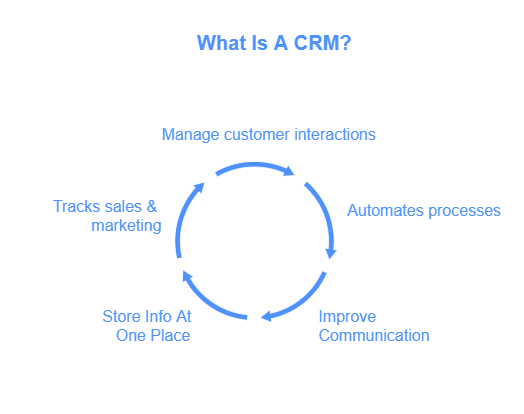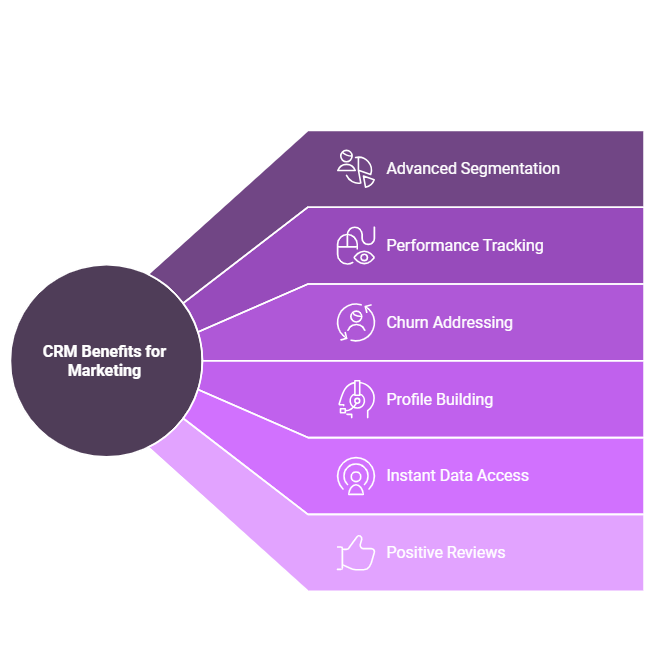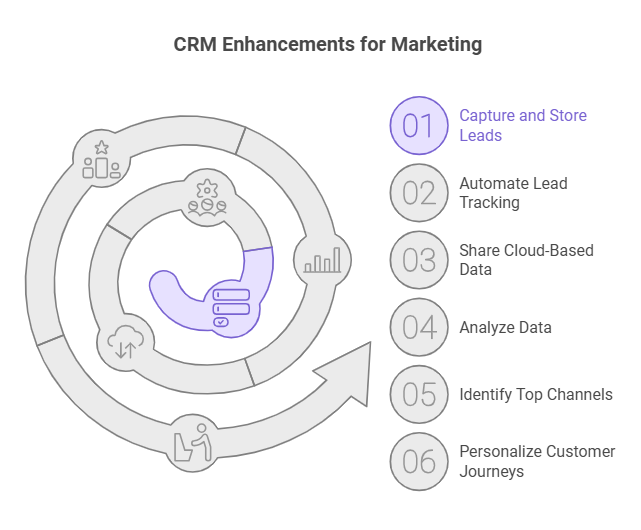Understanding your customers is essential for successful marketing in today’s competitive market
Customer Relationship Management (CRM) systems help businesses gather and organize customer information, enabling them to create more personalized marketing campaigns.
By using CRM tools, companies can better understand customer preferences and behaviors, leading to more effective outreach and stronger connections.
Additionally, CRM like marketing cloud promotes teamwork across departments, ensuring that sales, marketing, and customer service are all on the same page.
This collaboration not only enhances the customer experience but also drives sales growth.
Here, we will explore why is CRM important in marketing and what value can it offer.
What Is A CRM?
A CRM or customer relationship management system manages business operations and analyzes custom interactions from the first contact to the end of the relationship process.
CRMs help businesses in various ways, including the following:
- Storing essential customer information including, but not limited to, contact information, purchase history, and selection preferences.
- CRMs track customer interactions, i.e., via phone, email, and social media.
- Task automation that sends emails, schedules appointments, and generates reports that are essential but mundane and repetitive tasks.
- Running data analysis on customer data to find trends and insights repurposed and invested into sales and marketing efforts.
- Building personalized experiences in the form of product recommendations and targeted promotions.
What Does A CRM Do?
CRMs are essential for marketing professionals because they provide customer information. This information can be used to:
- CRM helps marketers segment customers into groups based on demographics, interests, and behaviors, allowing them to create targeted campaigns that are more likely to resonate with customers.
- CRMs can personalize marketing campaigns with emails tailored to each customer’s interests.
- Track campaign performance, such as open rates, click-through rates, and conversion rates. This information can be used to improve future campaigns.
- CRMs can help businesses improve customer satisfaction by better understanding customer needs and preferences.
- CRMs help businesses increase sales by identifying and targeting potential customers.
ELI5:what is CRM and how do/why would I use/implement it?
by insmallbusiness
Additionally you need a marketing cloud expert to enjoy all perks of CRM for marketer.
Why Is CRM Important For Marketing Professionals?
CRMs are a marketer’s best friend because it takes several tasks and data points and helps them understand their customer better.
More specifically, here are five reasons why is CRM important in marketing:
Using Data For Insights
We’ve discussed how important data has become for modern business, and marketing is a high priority.
Customer segmentation is a significant pillar of marketing that uses data as its foundation to group customers based on their demographics and preferences.
Comprehensive trend identification allows marketers to spot specific trends and behaviors, enabling them to develop marketing strategies that target exactly what the customer wants.
Instead of creating generalized marketing campaigns, using data for insights to understand customer behavior allows marketing teams to build better campaigns that customers resonate with.
Building Personalized Experiences
CRMs contain comprehensive customer data that tells marketers what the customer wants to see and which channel is the best to target them.
Some customers prefer social media, while others are inclined towards email marketing.
Targeting the customer in the right place at the right time translates into a personalized customer experience that acknowledges the customer on a deeper level.
Additionally, the company can push product recommendations based on purchasing and browsing history, increasing the likelihood of conversions.
Better Campaign Optimization
Marketing campaigns aren’t set in stone and are modified based on the needs at the time and consumer sentiment.
A marketing team using CRM helps track metrics such as click-through rates, open rates, and conversions.
It also helps understand campaign performance, knowing what works and what fails.
Knowing what won and lost is essential because the best marketing teams can double down on a winning formula while learning from a failed marketing effort.
CRMs make this easier by helping marketers run A/B testing with different channels and messages to see what works best for them.
CRMs are every marketing campaign’s best friend because of how much value readily available data provides.
Improving Customer Relationships
Building on the last point, CRMs store customer interaction information in one place, providing a unified view of each individual and allowing for more consistent and personalized communication.
Customer service teams can quickly access essential information to understand concerns and efficiently resolve issues, facilitating the best customer experience.
Marketing efforts that put the customer at the core of their messaging and campaigns are exponentially more likely to succeed than those made with the customer as an afterthought.
Brands that build customer relationships make the customer feel seen and acknowledged,, which is instrumental in building brand loyalty.
Brand loyalty results in repeat customers who bring more business with them each time, which is a win-win situation for both parties.
Making Marketing Efficient
CRMs don’t just make marketing better and more personalized; they also make it more efficient.
A CRM can automate essential but repetitive tasks, such as scheduling appointments, deploying email marketing campaigns, and entering data—three crucial business functions.
Process automation helps marketing teams with more pressing tasks because now they no longer have to worry about sending out necessary but time-consuming emails.
CRMs streamline marketing workflows, ensuring tasks are completed on time and improving team productivity.
Do Small And Midsize Businesses Need A Marketing CRM?
Contrary to popular belief, CRMS can similarly help small and midsize businesses as they assist enterprises in streamlining the entire marketing process.
The main reasons for small and midsize businesses requiring a marketing CRM include the following:
- SMBs often have limited resources, smaller teams, and budgets. CRMs help small businesses work smarter, not harder, by automating tasks and providing valuable insights from limited data.
- Since SMBs heavily rely on strong customer relationships, using a CRM helps track interactions, personalize communication, and ensure no customer is neglected.
- SMBs often have limited resources for market research, and a CRM can provide valuable data on customer behavior and preferences, guiding marketing and sales decisions.
- As an SMB grows, a CRM can scale, providing a solid foundation for managing a large customer base and expanding sales and marketing efforts.
- CRMs offer tiered pricing or even free plans specifically designed for SMBs, making them accessible and cost-effective.
Small and midsize businesses can extract just as much value from a CRM as a larger enterprise because, regardless of size, every business operates more or less similarly.
As we discuss ahead, the core benefits of using a marketing CRM for SMBs remain the same: better customer relationships, increased operational efficiency, and data-driven business growth.
What should I look for when choosing a CRM for a small to mid-sized team?
byu/VenJules inCRM
Benefits Of Using a CRM In Managing Marketing
We’re now at the business end of the article, discussing what most businesses look for when considering a CRM for marketing.
These are the benefits of using a CRM in managing marketing, highlighting the importance of using the right tools for the job:
Developing and Deploying Targeted Campaigns
CRMs help marketing teams advance beyond the generic age/location targeting method and help segment customers based on website behavior, purchase history, and various real-world metrics.
The marketing team can create personalized email subject lines and content, presenting offers to each customer’s interests.
The CRM automatically populates emails with the correct message, addressing the customer and creating a more personalized correspondence that helps the customer feel acknowledged.
Personalized messaging is tried and tested in terms of effectiveness because when customers receive an email with their names and interest-relevant information, they’re more likely to interact and hopefully convert.
Streamlining The Marketing Workflow
Using a CRM to streamline the marketing workflow includes tracking email open and click-through rates and determining which methods convert better and which fail.
This improves A/B testing accuracy because marketers can experiment with different subject lines, CTAs, and website content to determine what resonates most with their audience.
Additionally, the marketing workflow also benefits from predictive analytics, which some CRMs incorporate using AI to analyze datasets, proactively address potential customer churn, and find high-value leads.
Building Strong Customer Relationships
In this article, we’ve discussed the importance of strong customer relationships and how companies must invest in building and maintaining them.
CRMs contain customer data points, such as support tickets and website visits, that are used to build a complete picture of each customer’s interaction with the brand.
Additionally, CRMs can help improve customer service by providing support agents with customer information immediately after the customer contacts them.
They waste no time looking for a customer’s information because the CRM retrieves it immediately after the customer calls in.
Quick customer service and problem-solving reflect positively on the customer when leaving reviews and spreading word-of-mouth.
How To Choose The Right CRM For Your Business?
Now that we’ve discussed how CRMs help companies with their marketing, picking the right CRM for your business is essential.
Picking the right CRM is a multi-step process that involves various teams and departments.
This step-by-step process outlines how to pick which CRM works best for your business:
Having Clearly Defined Needs and Priorities
The marketing team should ask itself these questions:
- What do you want to achieve by incorporating a CRM into marketing? Do you lack customer data? Inefficient lead nurturing? Or poor customer communication?
- Which CRM features are most essential to your business? For example, marketing automation, email marketing, social media integration, customer support, or Salesforce automation?
- What kind of budget do you have?
- What team size and technical expertise do you have?
Researching and Comparing Different Options
With so many high-powered options on the market, picking the right one can be challenging for a company. Popular CRM options include:
- Salesforce (the king), HubSpot, and Zoho CRM as your all-in-one CRMs
- ActiveCampaign (marketing automation), Zendesk (customer service), and Pipedrive (sales)
Before settling on any option, it is important that you read product review and compare their features on websites like Capterra, G2, and Software Advice.
You want to evaluate each CRM option against the criteria in the last section as well as the one along with other internal requirements.
Additionally, most CRMs come with free trials and demos for the business to test and gauge whether it meets requirements and works as promised.
Evaluating Essential CRM Factors
In addition to the questions we asked at the beginning of the section, evaluate the CRM you pick based on these essential CRM features:
- How intuitive is the CRM interface? Can teams easily learn and use the software?
- Does the CRM integrate with other tools you use, e.g., email marketing platforms, social media platforms, e-commerce platforms)?
- Can the CRM grow with your business as your customer base and sales volume expands?
- Does the vendor offer adequate customer support (e.g., phone, email, chat)?
- What are the pricing options? Are there any hidden costs? It is essential to know what the final amount is before settling on it.
Consulting with Marketing Teams
Involve key stakeholders and get input from your marketing, sales, and customer service teams because they will be the ones using the platform.
Consider their needs and preferences and ensure the chosen CRM meets the needs of everyone who will be using it.
This step should be higher in the list because it is essential for the user base to know what they’re working with and have their opinion factored into the final decision.
If necessary, consult a Salesforce developer for technical input.
CRM Implementation and Training
The company needs to, at all costs, have a comprehensive CRM implementation plan that lists down data migration strategies, team training and education, and the CRM deployment.
Ideally, a phased implementation is better than a complete system overhaul because it allows users to learn the ropes of the system before a full-scale implementation.
Additionally, the company must ensure the team has sufficient resources and support to use the CRM effectively, as it is intended to be used. If needed, consult an implementation expert to ensure smooth deployment.
Post-Implementation Monitoring and Adjustments
The job isn’t over once the CRM is implemented, its performance needs to be monitored and adjusted where necessary.
Here’s how that works:
- Track key metrics to monitor the performance of your marketing campaigns and track the ROI of your CRM investment.
- Gather feedback from your team on their experience using the CRM.
- Make adjustments as needed based on your team’s feedback and performance data.
If needed, hire marketing cloud consultant to guide the process effectively.
How Does A CRM Make Marketing Easier?
We’re at the most important part of the article, explaining how CRMs can make marketing easier for company’s, regardless of size.
Keep Track Of New Leads
The CRM acts as a centralized stores to capture leads from various sources and store them in a single place.
This lead capture can be automated by integrating CRMs with website forms and other tools that automatically capture and store new in-bound leads.
Most CRMs store data in the cloud, making it easier for sales and marketing teams to access and share the lead information to ensure that no opportunity slips out of their hands.
In marketing, consumer data is incredibly important and needs to be readily available whenever the need arises and CRMs help make that possible.
Use Data To Improve Marketing
Marketing and data analysis are a match made in heaven, because of how well insights can be used to target the right customer with marketing material and messaging.
Monitoring metrics such as call-to-actions, different subject lines, open-rates, click-through rates, and campaign conversions allows marketers to know what works, what doesn’t, where to fix things, and where to double down their efforts.
Marketing data analysis also helps the company know which marketing channels is the most effective for lead generation and conversions, allowing them to invest their time and resources properly.
Map Out Customer Journeys
- Visualize the customer lifecycle with CRMs to help you visualize the different stages of the customer journey, from initial contact to purchase and beyond.
- Identify pain points by analyzing customer data to identify areas where you can improve the customer experience and address any pain points.
- Personalize the Journey by tailoring your marketing messages and offers to each stage of the customer journey.
Conclusion
Incorporating CRM into marketing strategies is no longer optional; it’s essential for businesses aiming to thrive in a crowded marketplace.
By leveraging customer data, companies can create targeted campaigns that resonate with their audience, ultimately driving engagement and loyalty.
A well-implemented CRM system transforms how businesses interact with customers, making every touchpoint more meaningful.
Moreover, CRM fosters collaboration among teams, ensuring everyone works towards common goals.
This enhances the overall customer experience and boosts sales performance.
As we move forward, embracing CRM and marketing cloud engagement will be key to staying competitive and building lasting relationships with customers.
FAQs
What are the different types of CRM systems?
The different types of CRM systems include:
- Operational CRMs
- Analytical CRMs
- Collaborative CRMs
What is the CRM cycle?
The CRM cycle includes:
- Identifying
- Attracting
- Acquiring
- Engaging
- Retaining
When should I invest in a CRM system for my business?
The best time to invest in a CRM system for the business is when your customer base is growing and the business needs to either improve customer relationships or automate marketing.
Can I grow my business with a CRM?
Yes. A CRM helps the business with sales growth, customer retention, and marketing effectiveness.
Is Salesforce Marketing Cloud A CRM?
Yes. It’s a suite of marketing automation tools within the Salesforce ecosystem, considered a type of CRM.

Hasan Mustafa
Engineering Manager Salesforce at Folio3
Hasan Mustafa delivers tailored Salesforce solutions to meet clients' specific requirements, overseeing the implementation of scenarios aligned with their needs. He leads a team of Salesforce Administrators and Developers, manages pre-sales activities, and spearheads an internal academy focused on educating and mentoring newcomers in understanding the Salesforce ecosystem and guiding them on their professional journey.




